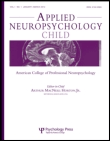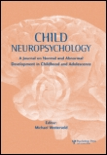
NEUROPSYCHOLOGY REVIEW
Scope & Guideline
Pioneering Research at the Forefront of Cognitive Science
Introduction
Aims and Scopes
- Cognitive Function and Impairment:
The journal consistently explores various aspects of cognitive functions, including memory, attention, executive function, and decision-making, particularly in populations with neurological disorders, brain injuries, and psychiatric conditions. - Systematic Reviews and Meta-Analyses:
A significant portion of the journal's publications involves systematic reviews and meta-analyses, providing comprehensive evaluations of existing literature and synthesizing findings to inform clinical practice and future research. - Neuropsychological Assessment and Interventions:
Research on the assessment tools used in neuropsychology and the effectiveness of various therapeutic interventions for cognitive impairments is a core area of focus, aiming to improve clinical outcomes. - Neuroimaging and Neurofunctional Studies:
The journal emphasizes studies utilizing neuroimaging techniques to understand the neural correlates of cognitive processes and impairments, contributing to the biological understanding of neuropsychological conditions. - Developmental and Lifespan Perspectives:
Research covering cognitive development across the lifespan, including childhood neurodevelopmental disorders and age-related cognitive decline, is frequently featured, highlighting the importance of context in cognitive assessment.
Trending and Emerging
- Neurofunctional Correlates and Neuroimaging:
There is a marked increase in studies investigating the neural bases of cognitive functions using advanced neuroimaging techniques, highlighting the integration of neuropsychology with cognitive neuroscience. - Cognitive Training and Rehabilitation:
Emerging themes focus on cognitive training interventions and their effectiveness across various populations, including those with neurodegenerative diseases and brain injuries, emphasizing the importance of evidence-based rehabilitation. - Psychosocial Factors and Cognitive Outcomes:
Research increasingly examines the interplay between psychosocial factors (such as stress, depression, and social cognition) and cognitive outcomes, reflecting a holistic view of cognitive health. - Impact of COVID-19 on Cognitive Function:
The journal has seen a rise in publications addressing the cognitive implications of COVID-19, including studies on cognitive decline following infection and the effects of long COVID on mental health. - Cultural and Contextual Considerations in Neuropsychology:
There is a growing emphasis on the importance of cultural factors in neuropsychological assessment and intervention, reflecting an awareness of the need for culturally sensitive practices in diverse populations.
Declining or Waning
- Focus on Single Condition Studies:
There seems to be a decline in studies focusing exclusively on single neuropsychological conditions, as the journal increasingly emphasizes broader systematic reviews that encompass multiple conditions and comorbidities. - Traditional Neuropsychological Testing Methods:
Research centered solely on traditional neuropsychological testing methods is less frequent, as there is a growing interest in innovative assessment approaches, including digital tools and neuroimaging. - Neuropathology Specific Studies:
Studies that solely focus on specific neuropathological conditions without integrating cognitive or functional outcomes appear less frequently, indicating a shift towards more holistic approaches that consider cognitive functioning in context.
Similar Journals

NEUROSCIENCE AND BIOBEHAVIORAL REVIEWS
Empowering research that shapes the future of neuroscience.NEUROSCIENCE AND BIOBEHAVIORAL REVIEWS, published by PERGAMON-ELSEVIER SCIENCE LTD in the United Kingdom, serves as a leading interdisciplinary platform for the dissemination of pioneering research and reviews in the realms of Neuroscience, Behavioral Neuroscience, Cognitive Neuroscience, and Neuropsychology. With an impressive impact factor reflected in its Q1 ranking across multiple categories for 2023, the journal is recognized for its rigorous peer-reviewed content that influences the advancement of scientific knowledge in behavioral and cognitive research. An essential resource for researchers, professionals, and students alike, the journal emphasizes the exploration of complex neural mechanisms that underlie behavior and cognitive processes. Despite being a subscription-based publication, the journal's extensive archive from 1978 to 2024 fosters a wealth of knowledge designed to inspire and facilitate future advancements within the field.

JOURNAL OF THE INTERNATIONAL NEUROPSYCHOLOGICAL SOCIETY
Transforming Understanding of Neurological DisordersJOURNAL OF THE INTERNATIONAL NEUROPSYCHOLOGICAL SOCIETY, published by Cambridge University Press, stands as a premier outlet for advancing the understanding of neuropsychology and its clinical applications. With a solid impact reflected in its Q1 categorizations in both Clinical Psychology and Neurology, alongside impressive Scopus rankings, this journal plays a critical role in disseminating cutting-edge research from 1995 to the present. It caters to a diverse academic community, including researchers, clinicians, and students, by providing a comprehensive platform for original research, reviews, and insightful commentaries that explore the intersection of neurological disorders and cognitive functions. Although not currently offered as an Open Access journal, its rigorous peer-review process ensures the highest standards of scholarly excellence. Engaging with the JOURNAL OF THE INTERNATIONAL NEUROPSYCHOLOGICAL SOCIETY means staying at the forefront of neuropsychological science and clinical practice.

Applied Neuropsychology-Child
Fostering interdisciplinary dialogue for child development.Applied Neuropsychology-Child is a leading academic journal dedicated to advancing the field of developmental and educational psychology, as well as neuropsychology, with a particular focus on child development. Published by Routledge Journals, Taylor & Francis Ltd, this journal provides critical insights into the cognitive and behavioral aspects of children, fostering interdisciplinary dialogue among researchers, clinicians, and educators. With a commendable impact factor and a categorization of Q3 in both associated fields for 2023, the journal plays a pivotal role in shaping current practices and enhancing academic discourse. Access to Applied Neuropsychology-Child is available through subscription, ensuring that high-quality research is disseminated widely amongst scholars and professionals. Since its inception in 2012, this journal has consistently aimed to illuminate the challenges and developments in child neuropsychology, making it an essential resource for anyone invested in the psychological well-being and educational success of children.

COGNITIVE NEUROPSYCHOLOGY
Elevating Knowledge in Cognitive Neuroscience and PsychologyCOGNITIVE NEUROPSYCHOLOGY, published by ROUTLEDGE JOURNALS, TAYLOR & FRANCIS LTD, is a premier academic journal that has established itself as a vital resource in the fields of cognitive neuroscience, neuropsychology, and psychology since its inception in 1984. With an esteemed impact factor that reflects its significance within the academic community, this journal is classified in the Q1 category for Arts and Humanities (miscellaneous) and Q2 in various other fields, including Cognitive Neuroscience and Developmental Psychology, based on the latest evaluation of 2023. COGNITIVE NEUROPSYCHOLOGY provides a platform for the dissemination of innovative research findings and theoretical advancements that deepen our understanding of cognitive processes and behavior in relation to neural systems. The journal also boasts a robust Scopus ranking, ensuring that articles published are of the highest caliber. Though it follows a traditional publishing model, the journal's commitment to rigorous peer review guarantees that it remains an authoritative voice for researchers, professionals, and students devoted to advancing knowledge in these critical areas of study.

NEUROREPORT
Shaping the future of neuroscience with every report.NEUROREPORT is a distinguished journal in the field of neuroscience, published by Lippincott Williams & Wilkins. With an ISSN of 0959-4965 and an E-ISSN of 1473-558X, the journal has established itself as a vital platform for disseminating innovative research and developments in the dynamic area of neuroscience since its inception in 1990. Currently, it is positioned in the Q3 category of the 2023 Journal Rankings, reflecting its respectable standing within the community of neuroscience professionals, ranked #74 out of 113 in general neuroscience on Scopus, placing it in the 34th percentile. While it operates on a traditional subscription model, NEUROREPORT is committed to fostering knowledge sharing in the realm of neurobiology, neuropharmacology, and cognitive studies among researchers, professionals, and students alike. With its broad scope and commitment to scientific excellence, the journal continues to be a cornerstone for those seeking to stay ahead in the evolving landscape of neurological research.

Revista Chilena de Neuropsicologia
Elevating Understanding in Neuropsychological DisordersRevista Chilena de Neuropsicología, published by Universidad de la Frontera, serves as a vital platform for the dissemination of research and advancements in the field of neuropsychology. This peer-reviewed journal aims to foster scholarly dialogue among researchers, professionals, and students, providing insights into the neuropsychological implications of various conditions and therapeutic interventions. By emphasizing high-quality, evidence-based studies, the journal significantly contributes to the understanding and treatment of neuropsychological disorders. While currently not an open-access platform, the Revista Chilena de Neuropsicología remains committed to enhancing the visibility and impact of neuropsychological research in Latin America and beyond. Researchers seeking to publish their findings will find it a reputable outlet to share transformative work that drives future studies and clinical practices.

Applied Neuropsychology-Adult
Connecting research and practice in neuropsychology.Applied Neuropsychology-Adult is a premier journal published by Routledge Journals, Taylor & Francis Ltd, dedicated to advancing the field of neuropsychology with a particular focus on adult populations. Since its inception in 2012, this journal has been a vital platform for disseminating innovative research, reviews, and clinical insights into the cognitive and psychological processes that influence adult behavior and functioning. With an impressive Scopus ranking, including Q3 status in both Developmental and Educational Psychology and Neuropsychology and Physiological Psychology, it demonstrates a commitment to high-quality scholarship that informs both clinical practice and theoretical understanding. Researchers, clinicians, and students alike will benefit from the journal's commitment to open access, providing broad access to valuable knowledge in the domain of neuropsychology. As it converges towards its 2024 milestone, Applied Neuropsychology-Adult continues to be an essential resource for those seeking to deepen their understanding of neuropsychological processes and their application in real-world settings.

PSYCHOPHYSIOLOGY
Advancing Insights in Psychological and Physiological Research.PSYCHOPHYSIOLOGY, published by WILEY, stands as a leading journal in the intersection of psychology and physiology, contributing significantly to our understanding of the brain and body connection since its inception in 1964. With an impressive scope covering areas such as biological psychiatry, cognitive neuroscience, and neuropsychology among others, the journal has earned multiple Q1 rankings in these critical domains as of 2023, reflecting its high impact in the field. The journal ranks particularly well in categories such as Experimental and Cognitive Psychology and neurology, indicating its status as a pivotal resource for professionals and researchers committed to advancing knowledge in psychophysiological studies. Furthermore, with an e-ISSN of 1469-8986, PSYCHOPHYSIOLOGY is accessible to a global audience, although it is not part of the Open Access movement, ensuring that its rigorous research remains a trusted source for academic excellence. By engaging with this journal, readers can expect to discover pioneering research and significant findings that push the boundaries of current understanding, making it an essential publication for those invested in the advancements of psychological and physiological sciences.

CHILD NEUROPSYCHOLOGY
Empowering Educators with Cutting-Edge Neuropsychological InsightsCHILD NEUROPSYCHOLOGY, an esteemed journal published by Routledge Journals, Taylor & Francis Ltd, focuses on the intricate interplay between neurological and psychological development in children. With an ISSN of 0929-7049 and an E-ISSN of 1744-4136, this journal has been a pivotal resource in the field since 1995, catering to researchers, clinicians, and educators alike. The journal holds a prestigious position in the Q2 quartile across key categories such as Developmental and Educational Psychology, Neuropsychology and Physiological Psychology, and Pediatrics, Perinatology, and Child Health as of 2023. Ranking in the 74th percentile for Pediatrics and reflecting its significant contributions, CHILD NEUROPSYCHOLOGY aims to publish groundbreaking studies that expand understanding of neurodevelopmental disorders and inform clinical practices. While not open access, the journal ensures high-quality, peer-reviewed articles that are vital for advancing knowledge and improving outcomes in child health and education. As it continues to bridge the gap between research and practice, CHILD NEUROPSYCHOLOGY remains an essential resource for those dedicated to advancing the science of child cognitive and emotional development.

Frontiers in Human Neuroscience
Connecting Minds: Where Neuroscience Meets Behavioral ScienceFrontiers in Human Neuroscience is a premier open access journal published by FRONTIERS MEDIA SA, dedicated to advancing the understanding of the complexities of human neuroscience. With an ISSN of 1662-5161, the journal has established its prominence in various fields, achieving a Q2 ranking in categories such as Behavioral Neuroscience, Neuropsychology and Physiological Psychology, and Psychiatry and Mental Health as of 2023. Since its inception in 2008, Frontiers in Human Neuroscience has consistently contributed to the scholarly dialogue by offering a platform for innovative research that bridges the gap between neuroscience and behavioral science. The journal's rigorous peer-review process and commitment to open access ensures that findings are readily available, promoting collaboration and progress within the academic community. With an impact on neuroscience disciplines, it stands at the forefront of the field, inviting researchers, professionals, and students alike to engage with cutting-edge studies and developments. The journal's address is located in Lausanne, Switzerland, where it continues to flourish as a hub for neurobiological exploration.